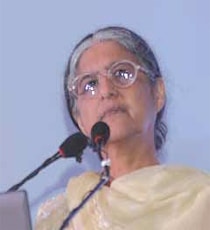
Prof Parvin Sinclair,
Director, National Council of Educational Research and Training (NCERT)
Of around 13 lakh teachers across the country, many are only partially trained, and yet they continue to teach as we face shortage of teachers
Every one of us had at least one teacher who we can look up to; this could be the teacher who ignited our minds with the desire of learning. We have to ensure that every child in the country has access to such teachers. The Right to Education Act was introduced in 2010. We could have been close to achieving the goal of universal education, if we had access to good quality teachers.
Lack of teacher training
Of the around 13 lakh teachers across the country, many are not properly trained for teaching. Despite not being fully trained for the profession, they are doing it because we are in need of teachers. There are several malpractices in the system. The semi-trained and un-trained people are hired with the thought that they will catch up with time and that catching up rarely happens. We have come up with the teacher education scheme of 630 crores which is far short of what we need. We can leverage different methods of open and distance learning, which we really have to. In a country like this that is the only answer. Some universities care about quality, some universities don’t. So how do we monitor that carefully?
One has to go to the field and live with the people in the rural areas. Most educators have not done this. If you look at national curricular framework that the NCERT is developing, you will find that we are opting for a very constructivist way of learning and teaching in a classroom. This kind of a system represents a sea change in the way think. But making it part of the school education system is a key challenge. The teachers, the teacher educators, the parents, the administrators, understand the requirements of constructivism. , This method of teaching grants more time to the learner to deal with each concept in his or her own way. But the system also requires flexibility of a certain kind. It requires an individualisation of the process in which the education is being imparted.
Changing the education system
It is imperative to bring changes in the way we provide learning to our students. Open learning allows that, but it requires a certain background, a certain maturity, a certain framework of thinking and working.
We also need to understand that if vocational education is only for profession, or is it for something more. Most of us have noticed that the world is becoming less humanist. So does that have something to do with the quality of our education and kind of areas that are left out in even professional education space? For instance, liberal arts are left out completely and so is a subject like moral science.
Inclusion is also very crucial. When the RTE Act was first framed we left out the disability sector, which was corrected subsequently. However, it needs a lot more thinking, doing and caring by all concerned. It is so inspiring to see people, who are eager to get into the educational mainstream. They positively want to be a part of everything. We need to look at some ways of bringing them in. Each of us is disabled in some way or the other. Education is for living, for sharing, for growing, for culture, and for civilisation. We simply can’t afford to put it aside.






















